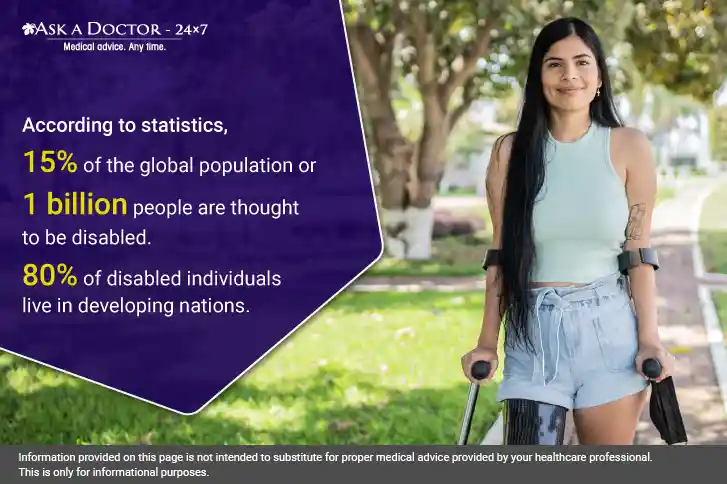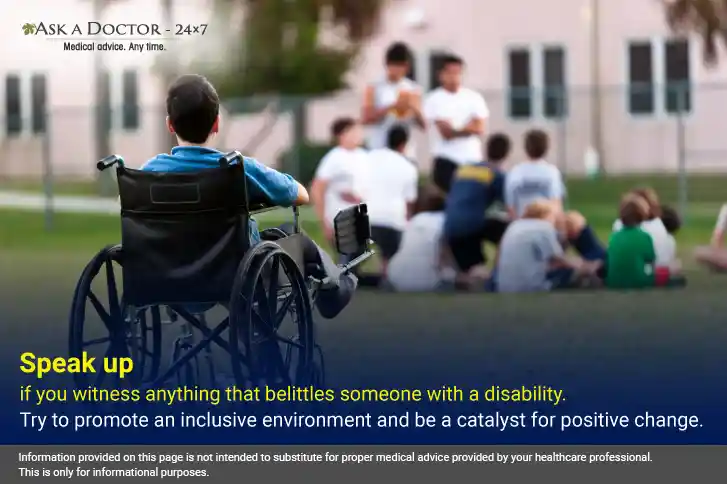Know 5 Facts About People With Disabilities And Learn Ways To Be More Inclusive
Disabled people are the world’s largest minority as disability transcends across gender, geography, religion, race, color, and other such boundaries. Disability is a multifaceted, intricate problem that can encompass physical, cognitive, and psychological impairments.
According to the WHO, disability has three dimensions that include impairment (problems in body function or structure), activity limitation (difficulty encountered by an individual when carrying out an activity or action), and participation restrictions (problems experienced when participating in life circumstances like engaging in social activities). Let’s understand the disability through this blog and root out misconceptions about what it's like to live with a disability. Let us strive to build a barrier-free environment for them.
5 Facts About People with Disabilities

Everybody's battling some kind of stereotype, and people with disabilities are not an exception. Let’s understand the facts about people living with disability:
1) Their lives are not totally different than ours
Persons with disabilities experience the same life events as everyone else. They go to school, get married, work, have children, do laundry, go grocery shopping, vote, pay taxes, get angry, have biases, and dream.
Many disabled persons are self-sufficient and able to help others. Before offering assistance to help someone with a disability, make sure they actually need it.
2) Discrimination is common
Disabled people throughout the world face discrimination and stigmatization that pose significant obstacles to obtaining education and career prospects.
3) Disability and poverty are linked
Both disability and poverty are linked. Poverty can raise the chance of disability likewise, disability can raise the likelihood of poverty. Poverty can lead to disability because impoverished individuals may not always have access to safe housing, adequate food, education, healthcare, clean water, and sanitary facilities. Conversely, being disabled may have social and economic repercussions that result in obstacles to work, education, income, and higher living expenses all of which may contribute to poverty. Disability can also raise one's chance of falling into poverty.
4) Females with disabilities face more violence
Women with disabilities are among the most disadvantaged who experience prejudice due to their gender and condition.
According to research, disabled women are more likely to be victims of emotional abuse, sexual assault, and domestic violence than women without disabilities. Also, women with disabilities could experience increased feelings of loneliness and helplessness to report the abuse or be dependent on the abuser for care.
They are typically mistreated by someone they know, such as a partner or family member, like many other women who experience violence.
5) Inaccessible infrastructure and care
People with disabilities may not be able to get medical care or commute to work or school due to inaccessible infrastructure. For many people with disabilities, exclusion and isolation are everyday experiences. Examples include sidewalks and curbs that are too high for wheelchair users to navigate, as well as public transportation that is inaccessible to people with mobility issues.
Learn Ways to Be More Inclusive with Disabled

Disability inclusion means including persons with impairments in daily activities and encouraging them to play roles that are comparable to those of their counterparts without disabilities. Let’s understand how we can be inclusive towards disabled people:
- Increase awareness and our understanding of disability: Awareness can be spread through the right information, education, and communication on disability. You can extend your support to the disability cause by incorporating regular acts of inclusion, changing the way you speak, developing a respectful curiosity, understanding their barriers, and following awareness groups on social media. The International Day of Persons with Disabilities is held every year on December 3rd to bring awareness to the pressing issues of disability and to bring about positive change in society.
- Establish a disability-inclusive infrastructure: When properly planned and executed, physical infrastructure, services, and systems can enable individuals with disabilities to participate in the advancement and transformation of society. Financial services, transportation facilities, assisted living facilities, online markets, and many more platforms and infrastructure components need to be inclusive.
- Employ people with disabilities: The disability community continues to face discrimination in the workplace, including being turned down for a job. In the end, though, employers must view a person as a willing resource rather than a possible liability, even if they have a disability.
- Support charities and donations: Raising awareness is not enough to bring about change; you also need to act directly. One excellent method to promote disability awareness and assist other disability campaigns is to give to charity and support them whenever you can. If you are unable to donate, you can volunteer your time and assist a local charity engaged in the cause.
- Speak up against any form of violence, especially against women and children: Any form of abuse to disabled people that can manifest as physical, emotional, or psychological abuse should be taken seriously and must be reported to the authorities in action.
Conclusion
Disability happens due to long-term physical, mental, cognitive, or sensory problems that limit the individual’s ability to fully engage in society. People with disabilities face a multitude of challenges like inaccessible infrastructure, poverty, education bias, not having access to quality healthcare, discrimination at the workplace, and violence, which limit the quality of their lives. We can promote disability inclusion by treating them fairly and equally. We should strive to make the workplace accessible for them, raise awareness about their issues, and support charities for the cause. Always remember to treat people with disabilities with equality and strive for quality change in their lives rather than acting out of pity.
If you have any questions related to disability or allied medical issues, you can check with our doctors at Ask a doctor, 24x7.
Recently Answered Questions Related to Disability and Associated Concerns
- What Could Be The State Of Mind Of A Child Who Is Often Surrounded With Disabled Children?
- Suggest Treatment For Depression And Suicidal Tendencies
- Physically Challenged, Stomach Pain. Ultrasound Shows a Small Right Kidney and an Immature Ovum. Will It Cause Infertility?
- Suggest Treatment For Deafness
- How To Treat A 40-55db Loss In Both Ears?
- What Are The Exercises Needed To Help The Pain In My Knee?
Disclaimer: Information provided on this page is not intended to substitute for proper medical advice provided by your healthcare professional. This is only for informational purposes.
Ask a Specialist
Recent Questions


